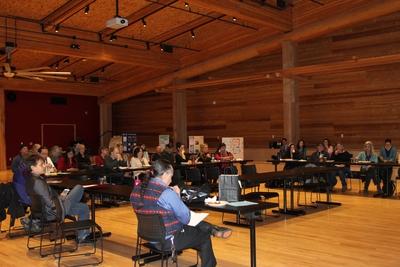Executive Summary
The Tribal Water Security Colloquium (TWSC) was hosted by the Water is Life: water, health and “ecosystem services” class taught by Dr. Clarita Lefthand-Begay in the Department of American Indian Studies. Undergraduate students enrolled in this class collaborated by picking, inviting and hosting leaders to speak about water. In the TWSC we focused our attention on creating a space where we could learn directly from influential tribal leaders whose communities are at the forefront of climate change and environmental challenges. In addition, we made a strong effort to privilege the voices and experiences of these community members. Due to industrial pollution, storm water pollution, and colonization, tribal nations face varying levels of water insecurity which has implications to food security, and cultural integrity. Globally and nationally, tribal water security issues have not received the attention needed to ensure safe water for all tribal members in the United States. In the TWSC, we aimed to bring awareness to these issues and to provide an opportunity for our audiences to hear directly from leaders. In order to highlight these shortcomings, and to understand these issues as experienced by community members, we hosted this Colloquium.
The Colloquium was held on May 13, 2016 and included a line-up of speakers who presented about the implications of the coal terminal permit at Cherry Point, efforts to reclaiming sacred waters, altered waterways resultant of climate change, restoration efforts and the cultural significance of water to tribal culture. In these presentations we learned about the significance of self-determination to address water security needs and how communities are working to address these problems. There were also 6 student poster presentations about uranium contamination in water, Elwha Dam removal, the Gold King Mine spill, fish consumption rate debate in Washington state, tribal fishing rights and clean water home delivery. Over 70 people attended the event, which was well above our expectation. In addition, the conversations inspired our audience to consider the water issues occurring in North America and to consider ways to achieve tribal water security. If you are interested in keeping up with this event over the years, please visit our website.
